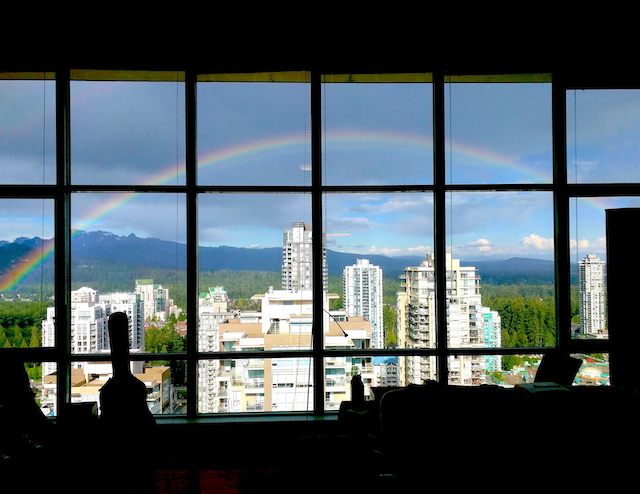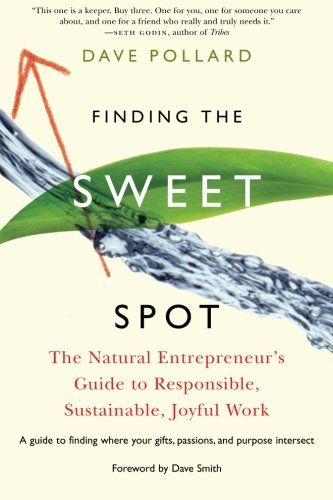The Way It Is

I‘m walking along the river path near my home and when I look up, there’s a black bear walking toward me. Not a big deal, I know, but a new experience for me. And the path is not that wide and it’s surrounded by trees. So when it’s about 8 meters away I turn around and, watching over my shoulder, walk the other way. Two other guys who were behind me on the trail see what’s happening and likewise, stop and turn around.
It’s a cliché, but I’m moving faster than the two guys, and feel enormous relief when I pass them — you know, “you only have to outrun the slowest guy”. We come to a fork and the three of us all take the lower path. The bear suddenly speeds up, takes the upper path, and then circles around through the trees to the lower path and stops right in front of us. We of course groan and turn around again. The bear gives us what can only be described as a look of pained annoyance, and then bounds off the path to the stream below.
As I make my way back, I wonder what it must be like to have everyone you encounter so frightened of you that they turn and walk the other way. I wonder what it must be like to have to deal with hordes of an insanely overly-populous, destructive, invasive species every time you just want to go for a drink.
And, most of all, I wonder what it must be like to just accept everything, the way it is, without judgment or expectation.
Last week I had been equally surprised to discover three fully-grown deer in the middle of a small city park, a park surrounded on all sides by busy four- and six-lane roads. They looked very stressed and skittish. No way out. I remember that feeling. To some extent we are perhaps all like them, today, trapped in a culture that no longer serves us, if it ever did, but unable to find our way to another culture that does.
In the light of the accelerating slide of much of the US into belligerent fascism, there has been a growing call by some progressives for stoicism. I think about that as I meander along the river path back towards home.
I mean, it’s not as if we have any choice. We can only feel what we feel, fear what we fear, and believe what we believe. Stoicism is not, as some think, a “stiff upper lip” suppression of one’s feelings — that can only end badly. True Stoics (capital “S”) believe in striving to live a natural life based on the virtues of wisdom, fairness, courage, and moderation, and eschewing “negative emotions”, which they assert are inevitably the result of poor judgment. It’s the judgments they try to suppress, not the emotions that those judgments can engender.
I think about my recent argument that, while some emotions (fear, rage/anger, sorrow, equanimity, and joy/enthusiasm) are instinctive and probably felt by all creatures, others (anxiety, hatred, envy, jealousy, shame, guilt, longing, loneliness, despair, and even love) require the making of, and a belief in, an unprovable assessment, deep inside your head, of what has happened, is happening, or will happen, and are, therefore (probably) uniquely human.
So the Stoics, I think, believe that through an attitude and practice of wisdom, fairness, courage, and moderation, the judgments and expectations we make can be minimized, and hence the “negative emotions” that stem from them can likewise be minimized. And, if that were to happen, the Stoic may then be able to live in the same state of mostly-equanimity-and-enthusiasm that wild creatures spend their lives in, except in fleeting moments of fight/flight/freeze stress. (Of course, for some wild creatures, like my neighborhood bears and deer, who are now constantly afflicted by our destructive and oppressive presence, those moments of stress are chronic, not fleeting.)
It’s perfectly understandable that many progressives and ‘moderates’, who have sat passively by for four decades as the decline into fascism has taken hold, and just hoped that it was a passing phase, are feeling some self-doubt, shame, guilt, and despair for their quiet complicity in the demise of democracy and of tolerance for diversity which seems rampant everywhere these days. But my sense is that they are small “s” stoics, rather than capital “S” Stoics. The small “s” stoics, I suspect, will keep voting for the doddering war-mongering xenophobe Biden and his Wall-Street-beholden party, as it loses to the ends-justify-the-means fascists driven by generations of fear, hatred, and resentment.
The capital “S” Stoics will instead withhold their votes and patiently await the slow collapse of the US Democratic party, and their fake-liberal counterparts in other nations, paving the way for the eventual birth of radical green/socialist parties when citizens turn away, finally, from the reigning fascists in disgust. It’s likely to be bloody, and take a long time, but that, the Stoic will tell you, is the nature of humans and how social change happens. Economic and then the ecological collapse will weigh heavily on the trajectory and the outcome of this political disintegration and re-emergence. By then politics may have become a much more local matter.
As I feel neither responsible for, nor patient with, this likely-brutal process, I qualify as neither stoic nor Stoic. But I have no choice in this, either. I can only attempt to divert my attention to matters less trying, and less ugly. In part, that is what these walks are about — more perceiving and less conceiving, more noticing and less thinking.
The Skytrain in our area is elevated, with lovely, changing lights at night on its support beams, and in many areas a broad pedestrian/bikeway beneath the tracks. These long islands of concrete have stone and steel benches along them, though I rarely see anyone using them. As I walk along one of them now, a car drives alongside blasting a song I recognize.
An aside here: I was first drawn to listen to K-Pop music just a few days ago by an article in the New Yorker, and thence to an extensive overview in NPR. As a lover of complex, layered, harmony-rich music, I was immediately entranced: K-Pop has come a long way in the last decade from its institutionalized, sexualized, exploitative, repetitive roots to embrace a ton of international musical influences, and now produces a dazzling array of some of the most polished, intricate and diverse dance music ever produced. I found the music of the more-popular boy bands too simple for my tastes (BTS sounds too much like a clone of Bruno Mars to me — check out the #s of views for these songs, though!). The girl bands, having to be twice as good to attract the same audience, have done exactly that. Richer harmonies, more sophisticated rhythms and melodies, and full of infectious joy. Yeah, I know they’re still exploited. That’s what happens when money enters the picture.
So the song I hear from the car alongside me is Rain on Me, by the K-Pop girl group MAJORS (you can hear it, if you’re interested, as the 5th cut in my K-Pop favourites playlist). I figure it’s probably a carful of young women blasting it and singing along, but I’m caught up in the music and I just spontaneously start to dance on this concrete island that’s as big as a dance floor. I’m a terrible dancer, but I’m just having fun and laughing as I look over into the car and it’s two guys blasting the music, which surprises me. They zoom off, and, when I get home I research the gender mix of K-Pop fans, and to my astonishment, I learn that the fans of all the girl groups on my K-Pop playlist are overwhelmingly male, while most of the other girl groups I’ve listened to since I became infatuated with K-Pop music have overwhelmingly female fans. What’s the difference? Not the degree of eye-candy (all K-Pop music, by both genders, is eye-candy). I think it’s the intensity, the relentless beat, and the strong, layered harmonies. Maybe Korean men actually like powerful, confident, fierce women? Or maybe I’m just a stan.
So now I can’t get the song out of my head and, the bear forgotten, I’m dancing all the way home. There’s a sudden storm in the mountains above me, but it’s still mostly sunny here. I am filled with a sense of elation. This world is fucking amazing, and we’re all so wrapped up in the crises of the moment, our personal traumas, and the endless doom-scroll, that we’re missing it all. It’s right here.
I grab a soy matcha from the local café and take the elevator up, still glowing. And when I walk through the door to the apartment, what I see out the window is the image at the top of this post.
We’re totally fucked. It’s going to get awful. But I’m just standing here staring out the window at this incredible scene, smiling, singing, laughing, dancing.
Nothing else to be done.

Finding the Sweet Spot: the natural entrepreneur's guide to responsible, sustainable, joyful work
"Now what am I going to do?" is a question many people ask—and leave unanswered—at critical potential turning points in their careers. Perhaps you’re a new graduate, but instead of lining up for a boring entry-level job at a big corporation, you wish you could start your own sustainable and responsible business






